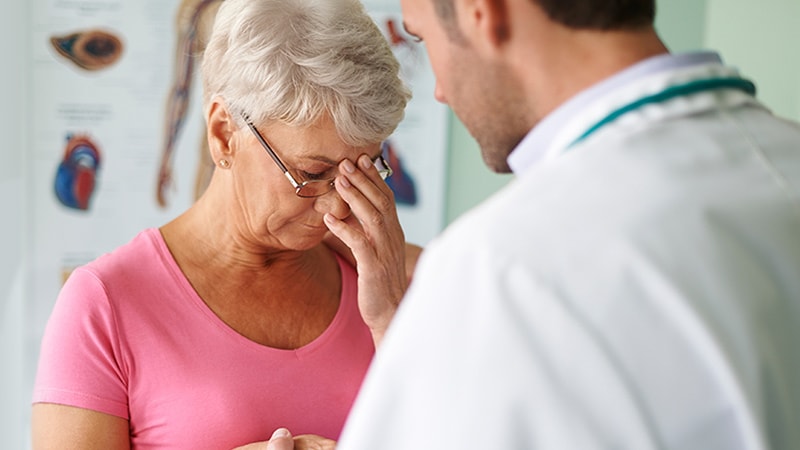People with eosinophilic esophagitis (EoE) may run an increased risk of mood disorders, anxiety, and attention-deficit/hyperactivity disorder (ADHD) and should be screened for those conditions, researchers say.
“It’s important to know that there is an elevated risk of those diagnoses, so you have that in mind when you treat your patients. You can assess their quality of life and the status of their mental state,” said lead author Lovisa Röjler, MD, a pediatrician and doctoral student at Örebro University Hospital in Sweden.
“Psychiatric disorders are not found with a blood sample or radiology examination,” she told Medscape Medical News.
The study was published online in the American Journal of Gastroenterology.
Elevated Risk Found
Previous studies into the relationship between EoE and anxiety and depression have conflicting conclusions.
In the hope of shedding further light, Röjler and colleagues analyzed data from Sweden’s ESPRESSO cohort, which consists of more than 6 million biopsy samples from the gastrointestinal tract that were collected from throughout the country during the years 1965–2017.
They identified 1458 people with EoE who had not experienced psychiatric events before being diagnosed with EoE. Of these, 70% had dysphagia, and 58% had food impaction.
In the study, up to five reference persons (6436 people) without EoE who were identified from the Swedish Total Population Register were matched to the patients with EoE by age, sex, county, and year of diagnosis.
Among the people with EoE, there were 106 events of psychiatric disease, at an incidence of 15.96 per 1000 person-years, vs 10.93 per 1000 person-years (331 events) among those without EoE. This 50% increased risk for psychiatric illness for people with EoE was statistically significant (hazard ratio [HR] = 1.50, 95% CI = 1.20 – 1.87).
To adjust for genetic and environmental confounding factors, the researchers compared the rate of psychiatric events among 1055 people with EoE to that of siblings who did not have EoE (1699 people). There were 74 events of psychiatric disease among the siblings (8.99 per 1000 person-years). From this the researchers calculated a 62% increased risk of psychiatric events for those with EoE (HR = 1.62, 95% CI = 1.14 – 2.31).
There was no difference in risk for psychiatric disorders by educational attainment, though people for whom there were no data on education were at increased risk.
There was also no difference in psychiatric risk associated with the use of steroids or proton-pump inhibitors for EoE, though these medications have sometimes been linked to psychiatric disorders.
After adjusting for inflammatory bowel disease, celiac disease, and asthma, the researchers still found an increased risk of psychiatric events.
Also, the people who had EoE were no more likely than the reference persons to have had psychiatric events before their diagnosis, suggesting that EoE caused the psychiatric events rather than the other way around.
Previous researchers have found a similar association with psychiatric illness in people with celiac disease and inflammatory bowel disease. The researchers speculate that people with EoE might develop psychiatric illnesses because their symptoms and treatments, such as restrictive diets, cause stress and chronic pain and thereby cause problems with education, work, and social and economic status.
Röjler recommends that clinicians use questionnaires to identify mood disorders and ADHD in their patients and then refer them to a mental health professional.
Screen for Psychiatric Disorders
Tiffany Taft, PsyD, a research associate professor of medicine at Northwestern University in Chicago, Illinois, who was not involved in the study, agreed that patients with EoE should be screened more often for psychiatric disorders.
“We’ve found that symptom-specific anxiety is prevalent and associated with other outcomes, like quality of life, so it may not be the typical anxiety that you would diagnose from the Diagnostic and Statistical Manual of Mental Disorders,” Taft told Medscape Medical News.
While anxiety is not likely to trigger EoE, it can worsen the symptoms, she said.
Sometimes helping patients make the connection between their mental health and EoE can address the anxiety itself.
“Education is good enough for a certain chunk of patients,” Taft said.
Other patients benefit from cognitive-behavioral therapy, which gives them a more realistic understanding of their situation.
“We also add in relaxation, deep breathing, and guided imagery to calm down the stress response in the body, which is part of that brain-gut connection that enhances symptom severity,” she said.
Some patients prefer medications, or they rely on medication because that is what their insurance provides, she said. She added that most patients do best with a combination of medication and talk therapy.
Ideally, people with these disorders would be referred to someone such as herself, a psychotherapist with a specialty in gastroenterology, Taft said.
But there are not many people in that subspecialty, so if a gastroenterology psychologist is not available, a psychologist who specializes in treating mental illness associated with chronic diseases is a good second choice.
The study was funded by Örebro County Council and Karolinska Institutet. Röjler and Taft report no relevant financial relationships.
Am J Gastroenterol. Published online March 28, 2022. Abstract
Laird Harrison writes about science, health, and culture. His work has appeared in magazines, newspapers, on public radio, and on websites. He is at work on a novel about alternate realities in physics. Harrison teaches writing at the Writers Grotto. Visit him at lairdharrison.com or follow him on Twitter: @LairdH.
For more news, follow Medscape on Facebook, Twitter, Instagram, and YouTube.
Source: Read Full Article
